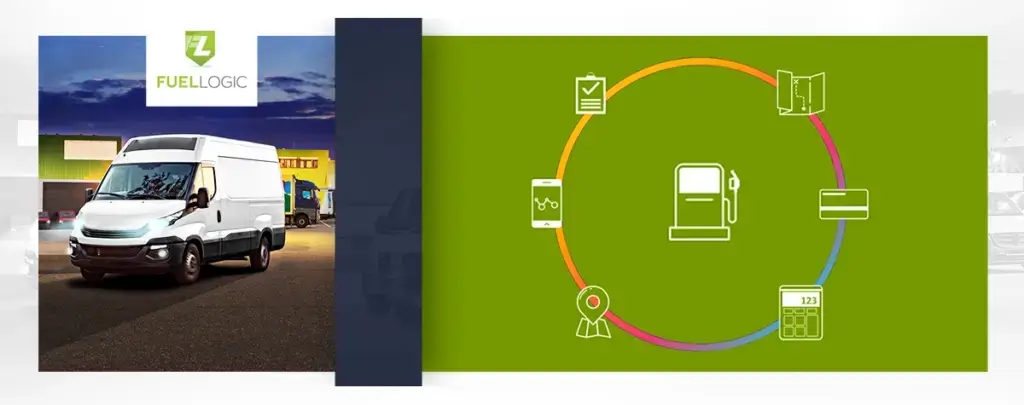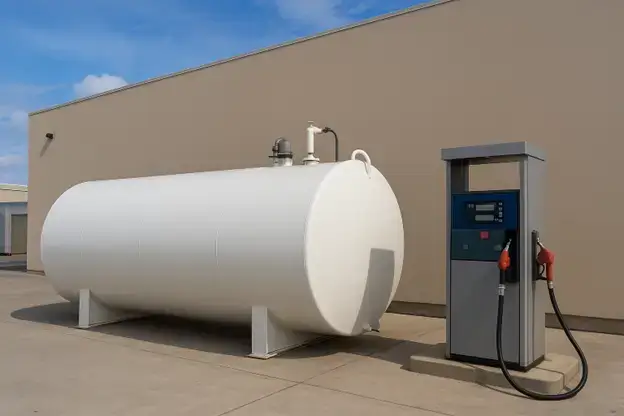Selecting the best fleet fuel management solutions is important to streamline operations and improve efficiency. In this article, we will discuss some of the top fleet fuel management solutions proven to deliver tangible results.

Best Practices for an Effective Fleet Fuel Management System – Increase Your Efficiency While Reducing Costs

Fuel is to the modern world what food is to the human body – a necessity for life and vitality. It serves as the primary source of electricity and is the driving force behind transportation. The industrial world owes its existence to the availability of fuel.
Fuel costs affect a company’s profitability by highlighting the importance of maximizing fuel efficiency and minimizing fuel consumption. When fuel costs rise, it becomes evident that companies should focus on fuel efficiency.
In 2022, fuel prices reached unprecedented highs worldwide. With factors such as limited supply and changing oil prices driving up fuel costs, the imperative to manage these expenses is growing, especially for fleet managers, irrespective of the size of their vehicle fleets.
What Is Fleet Fuel Management?

So, What is Fleet Fuel Management? Fuel management is the practice of efficiently and effectively managing a fleet of vehicle’s fuel consumption and associated costs. In the fleet fuel management process, various strategies are employed in order to ensure the smooth operation of the fleet.
Fleet fuel management systems are crucial for several reasons:
- Cost Control: They help businesses control one of their most significant operational expenses – fuel costs. By monitoring your consumption, identifying inefficiencies, and optimizing routes, companies can reduce fuel expenses. It ultimately improves their bottom line.
- Fuel Efficiency: Fuel management systems provide real-time data on fuel usage. This information allows fleet managers to implement strategies to enhance fuel efficiency, such as driver training, maintenance schedules, etc.
- Driver Accountability: Fuel management systems can track driver behavior, promoting responsible driving habits that save fuel and reduce wear and tear on vehicles. Incentives and training can be based on this data to encourage better performance.
- Competitive Advantage: Efficient fleet management can translate into more competitive pricing for customers, potentially leading to increased business opportunities and market share.
To monitor and manage fuel consumption, fleet fuel management practices are fundamental. Some fleet management best practices are:
- Regular Vehicle Maintenance: Keep vehicles well-maintained to ensure they operate at peak efficiency. It includes frequent oil changes, tire maintenance, and engine tune-ups.
- Vehicle Selection: Choose fuel-efficient vehicles when purchasing new ones. Consider hybrid or electric options.
- Fuel Economy Insensitivities: Offer incentives or rewards for drivers who consistently achieve good fuel economy.
- Real-Time Monitoring: Implement telematics and tracking systems to monitor real-time fuel consumption, vehicle performance, and driver behavior. This data can be used to make immediate improvements.
How Do You Monitor Fleet Fuel Consumption?

Effective fleet fuel management solutions integrate telematics data with advanced analytics to optimize fuel usage, minimize waste, and lower overall costs. The most effective way to monitor fleet fuel consumption is to combine technologies, data collection methods, and analysis tools. For example:
- Regular Data Collection: Ensure data from telematics systems and fuel sensors are collected consistently. Any data gap or inconsistency should be checked.
- Maintenance and Repairs: Use fuel consumption data to address any issue that may be affecting fuel efficiency, such as engine problems or tire wear.
- Regular Reporting: Generate regular reports that provide insights into fuel consumption trends, expenses, and overall fleet performance. These reports should be shared with the stakeholders.
How Do Fleet Fuel Management Systems and Software Work?
In the past, fleet managers relied on manual pen-and-paper methods to record fuel consumption, a process that was time-consuming and environmentally unfriendly. However, nowadays the use of fuel management software enables fleet managers to capture and store fuel data automatically.
“ Fleet management systems work through a combination of hardware and software to monitor, track, and optimize various aspects of a fleet of vehicles. Fleet management systems typically involve the installation of hardware devices in each vehicle. These devices may include GPS trackers, vehicle sensors, and communication modules. The installed hardware collects various data points in real-time. The fleet management software processes and analyzes the incoming data.
What Are The Benefits Of A Fleet Fuel Management System?
Fleet fuel management systems offer several benefits:
Cost Savings
Improved fuel efficiency and reduced fuel consumption lead to significant cost savings. Efficient fuel management helps control one of the most substantial operational expenses for fleet-based businesses.
Enhanced Efficiency
Cost savings directly contribute to increased profitability, as businesses can maintain or enhance profit margins by managing fuel expenses more effectively.
Theft Prevention
Fuel management systems can include security features to prevent fuel theft and unauthorized fuel card use, protecting a company’s assets and reducing the risk of financial losses.
Real-time Monitoring
Fleet managers can monitor fuel consumption, vehicle performance, and driver behavior in real-time, enabling immediate responses to issues and opportunities for improvement.
Environmental Impact
By promoting fuel efficiency and reducing fuel consumption, these systems help reduce a fleet’s carbon footprint and support environmental sustainability goals.
Best Practices in Fleet Fuel Management
Assess Fuel Purchasing Options
Assessing fuel purchasing options involves a systematic approach to determine the efficient way to acquire fuel for your fleet. You can start by understanding your fleet’s fuel consumption patterns, including the types of vehicles, their fuel efficiency, and the total volume of fuel needed. Determine the types of fuel your fleet requires, such as gasoline, diesel, etc.
Research potential fuel suppliers and understand the pricing structure they offer. Fuel Logic is one of the reliable fuel sources that allows you to forget about waiting at the gas stations and spending too much money.
Fleet Optimization

Fleet optimization is the combination of strategies for improving the productivity and overall performance of a vehicle fleet. Downsizing to smaller vehicles is a strategic decision for businesses. It can bring advantages like fuel savings and improved maneuverability. Upgrading to fuel-efficient and eco-friendly ones can also offer similar benefits.
Furthermore, understanding your fleet is crucial in effective fuel management. Fuel Logic offers you a custom solution to align with your daily business requirements. Whether you manage a fleet of trucks and trailers or require on-site fueling services, Fuel Logic is here with effective and long-term solutions.
Track Fleet Driver Behavior

Monitoring and tracking fleet driver behavior is a crucial aspect of effective fleet management. This includes aspects like distracted driving, reckless driving, idling, personal stops, and speeding.
By monitoring fleet driver behavior systematically and effectively, you can promote safer driving practices and reduce accidents and associated costs. It will enhance overall fleet safety and uphold compliance with fleet policies and regulations.
Keep Vehicles Clean and Well-Maintained

Well-maintained vehicles operate at their peak performance levels. This means engines run efficiently, transmission shifts smoothly, and all vehicle components are in good working order.
To keep the vehicles clean and well-maintained, keep a check on the following:
- Oil levels: Engine oil is vital for lubricating engine components, reducing friction, and preventing excessive wear. Monitoring oil levels ensures that engines are adequately lubricated, extending their lifespan.
- Fluid levels: Coolant (antifreeze) is crucial for regulating engine temperature. Proper coolant levels prevent overheating, which can lead to engine damage and costly repairs.
- Wheel alignment: Misaligned wheels can cause tires to scrub against the road. This extra resistance leads to reduced fuel efficiency as the engine works harder to overcome it.
- Tire inflation: Properly inflated tires reduce rolling resistance, which can significantly impact fuel efficiency.
- Air filters: Clean air filters and adequately maintained fluids contribute to engine efficiency. Dirty filters can increase fuel consumption.
- Fuel filters: Clogged or dirty fuel filters can restrict fuel flow, leading to reduced power output and increased fuel consumption.
Efficient Route Planning and Optimization

Planning efficient routes is crucial for reducing fuel consumption in fleet management. Efficient routes are shorter, have fewer stops, and minimize detours. It reduces the total distance traveled, reducing fuel consumption and cost savings.
Several route optimization tools and software solutions are available to help businesses and fleet managers plan efficient routes. Route4me, for instance, is a versatile route optimization platform that offers features like real-time tracking.
Get a Fleet Fuel Card

Fuel card providers often negotiate special discounted rates with fuel stations, which can be significantly lower than retail prices. Many fuel cards offer volume-based discounts, where the more fuel you purchase, the greater the discount you receive.
Fuel Logic offers Gas Fleet Cards to enable businesses to procure fuel and maintenance services for their vehicles and equipment.
If you are a small business, then consider getting a Fleet Fuel Card from Fuel Logic. It will help you monitor your expenses to run your business efficiently.
Allow Fuel Logic to take the stress of fuel off your plate.
Use Fleet Telematics
The importance of telematics lies in its ability to provide valuable data and insights for businesses, especially fuel management companies. The following are some key features:
- Telematics systems offer real-time tracking and monitoring of vehicles, allowing fleet managers to track the location efficiently,
- It provides data that helps identify risky driving patterns and allows corrective action to improve driver safety.
- Telematics can monitor vehicle health and provide alerts for maintenance needs, reducing unexpected breakdowns and increasing the lifespan of fleet vehicles.
- Telematics data can identify cost-saving opportunities, such as reducing idle time and unauthorized vehicle use and optimizing maintenance schedules.
Increase fleet efficiency using fuel logic’s Fleet fuel management
Don’t let downtime slow you down. Fuel Logic delivers diesel on-site, 24/7, so you stay on schedule.
How Does a Fleet Fuel Management System Help?
A fleet fuel management system is a valuable tool for fleet managers. It keeps track of the fuel consumption of each vehicle. Furthermore, it analyzes other variables like speed, route, and driver’s behavior, providing insight into fuel efficiency.
“ The system can monitor and report instances of excessive idling and irregularities in fuel levels. In this way, Fuel management in fleet management helps managers take corrective measures to reduce any potential problem.
There’s no need to waste your time when Fuel Logic presents you with a customized solution. Fuel Logic can assist you in gaining full control of your fleet’s fuel efficiency.
Our dedicated team of experts is at your disposal to optimize and enhance fuel efficiency uniquely tailored to your company’s needs.
⚡ Key Takeaways
- Implementing a fleet fuel management system can significantly reduce fuel costs by optimizing fuel consumption and monitoring fuel transactions in real-time.
- Utilizing telematics solutions and management software allows fleets to track vehicle mileage, odometer readings, and fuel inventory, leading to improved fuel efficiency and reduced waste.
- Automated fuel management tools, such as fuel monitoring systems, enable fleets to easily log fuel purchases and authorize fueling operations at various fuel sites.
- By analyzing driver behaviors and utilizing a dashboard for data capture, fleets can identify fuel-wasting driving habits and optimize routes to enhance fleet productivity.
- Investing in a reliable fleet fuel management platform can provide detailed reports on fuel spending, helping managers make informed decisions about fleet maintenance and operational efficiency.
FAQs (Frequently Added Questions)
What is a fleet fuel management solution?
A fleet fuel management solution is a system or strategy that helps businesses monitor, control, and optimize fuel usage across their fleet of vehicles to reduce costs and improve efficiency.
Why is fuel management important for fleets?
Fuel is one of the largest operating expenses for fleets. Proper management reduces fuel waste, prevents theft, improves driver accountability, and lowers overall operational costs.
What are the best fleet fuel management practices?
Key practices include regular vehicle maintenance, driver training, real-time fuel monitoring, efficient route planning, and using fuel cards and telematics systems.
How do telematics help in fleet fuel management?
Telematics provides real-time data on vehicle location, speed, idling, and driver behavior. This data helps managers optimize routes, reduce fuel waste, and identify areas for improvement.
Can fuel cards help manage fleet expenses?
Yes. Fuel cards track purchases, provide detailed reports, and often offer discounts on fuel. They help control spending and prevent unauthorized fuel usage.
What technologies are used in modern fleet fuel management solutions?
Technologies include GPS tracking, fuel sensors, telematics platforms, mobile apps, and cloud-based management software for real-time monitoring and reporting.
How can fleet managers reduce fuel consumption?
By maintaining vehicles regularly, monitoring driver behavior, reducing idle time, choosing fuel-efficient vehicles, and optimizing routes with management software.
What are the benefits of implementing a fleet fuel management system?
Benefits include cost savings, improved efficiency, reduced environmental impact, better compliance, theft prevention, and increased profitability.
How does route optimization improve fuel efficiency?
Route optimization reduces unnecessary mileage, detours, and idle time, lowering fuel usage and helping fleets operate more efficiently.
Who provides the best fleet fuel management solutions?
Providers like Fuel Logic deliver reliable on-site fueling, bulk fuel delivery, fleet fuel cards, and customized solutions to help businesses cut costs and improve fuel efficiency.








